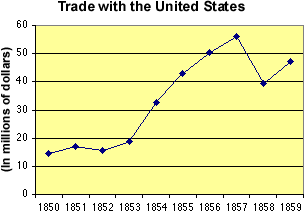Economics
 There was a great advantage for traders who lived in British North America. Because they were a part of the British Empire, they received a favoured status when they traded with Britain. The result of the favouratism was that owners of products like wheat and timber paid little or no taxes when entering Britain. The people who were not a part of the British Empire had to pay high taxes when they imported products to Britain.
There was a great advantage for traders who lived in British North America. Because they were a part of the British Empire, they received a favoured status when they traded with Britain. The result of the favouratism was that owners of products like wheat and timber paid little or no taxes when entering Britain. The people who were not a part of the British Empire had to pay high taxes when they imported products to Britain.
In 1854, the Reciprocity Treaty was signed between British North America and theUnited States. The treaty increased trade with the United States (see graph) because British North American Colonies could now sell their products to the United States without having to pay high taxes whenever they imported products to another area. Soon, because of the Treaty of Reciprocity, new American markets were joining already established British markets.
 There was a great advantage for traders who lived in British North America. Because they were a part of the British Empire, they received a favoured status when they traded with Britain. The result of the favouratism was that owners of products like wheat and timber paid little or no taxes when entering Britain. The people who were not a part of the British Empire had to pay high taxes when they imported products to Britain.
There was a great advantage for traders who lived in British North America. Because they were a part of the British Empire, they received a favoured status when they traded with Britain. The result of the favouratism was that owners of products like wheat and timber paid little or no taxes when entering Britain. The people who were not a part of the British Empire had to pay high taxes when they imported products to Britain.